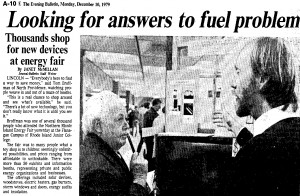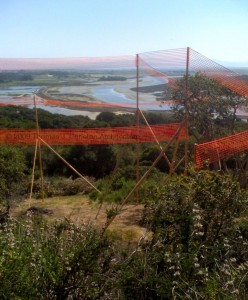Futuristic Cities
May 25th, 2009I have long been fascinated with illustrations depicting cities of the future. This older graphic (Future City by Frank R. Paul) is one of my favorites because of its bold forms and colors. These utopian depictions of the future in print and film share common characteristics. Presumably we would all be living and working in very dense mega-structures. Some would drive highway vehicles on controlled traffic routes which bridge from high-rise building to building. Others would operate personal planes on guide paths in the sky. The glistening architecture of the future would have smooth rounded shapes without any reference to historic styles. The artist’s rendering is devoid of deterioration, litter, pollution, or any other unpleasantries.
I wonder if there is room for individual expression or small group activities. Where are the mothers and fathers pushing baby strollers through the neighborhood? Where are the houses of worship? Many of these visions (past and present) promote a brave, new, secular and socialist urbanism.
-TJC
Buy Local
May 18th, 2009The Salinas Valley Chamber of Commerce has launched a “Buy Local” campaign. By supporting local businesses, you contribute to the health of the regional economy as a whole. Here are a few good reasons to use local businesses:
- A local reputation for good work.
- Dedication to the improvement of our communities.
- Assistance to local nonprofits and donations to local causes.
- Easy to contact and quick to reply.
Hmmm, that sounds a lot like what we do. In addition TJC has all of the following advantages:
- Familiarity with local topography and micro-climates.
- Appreciation for the “regional vernacular” architectural styles.
- Familiarity with contractors that you can trust.
- Familiarity with local material suppliers and their products.
- Knowledge of our unique zoning regulations.
- A rapport with agents in building departments.
So buy local and hire TJC.
-TJC
Mapping Modernism
May 11th, 2009A free map of local modern architecture has been published by the Monterey Bay Chapter of the American Institute of Architects (AIAMB). More than fifty commercial and residential designs (since 1947) have been photographed and mapped. If you like to gawk at modern buildings, this is the directory for you. Some of the entries are well known, like the original Community Hospital of the Monterey Peninsula designed by Edward Durell Stone (1967), but other buildings, such as private homes, are cited which I had not seen before. Some buildings made the list because they were designed by a famous architect, such as the La Mirada addition to the Monterey Museum of Art (1994) by Charles Moore, who is one of my favorite architects. Many other notable structures have been designed by local firms. Several brand new buildings are included, such as the impressive Tanimura & Antle Library on the CSUMB campus.
The publication was put together by a dedicated group of volunteers from AIA Monterey Bay with a grant from the state chapter. The guide is conveniently grouped into communities so that you can take several short excursions. It even branches into Santa Cruz and the Salinas Valley. So start planning your tours for the summer. To get a free copy of the large folding map, call AIAMB at 831-372-6527, or email: aiamb@sbcglobal.net.
-TJC
History Often Repeats
May 3rd, 2009
The headline “Looking for Answers to Fuel Problem” could have been in this morning’s newspaper. But the date on this article is actually 1979. That long haired fellow on the right is me, explaining how a solar room heater works. Those were energizing times when gas lines were long but entrepreneurial spirits were high. I was fabricating prototypes of passive solar panels, designing fliers, and setting up displays at local energy fairs. If sales had matched my expectations, I may not have returned to my architectural trade.
When I toured the booths at the Green Expo in Monterey last year, the enthusiasm of the young entrepreneurs reminded me of earlier times. I have to admire their zeal. Opportunities for small and creative entrepreneurs need to be encouraged.
A local program that offers promise is “Step Up 2 Green” which encourages homeowners to go green by taking small steps. They have published a one-page guideline listing ways to “save money by reducing the use of energy and water, and ending up with a healthier indoor environment.” Go to their website at stepup2green.org.
-TJC
Your Town – April 27, 2009
April 25th, 2009
Tom Carleton has lined up another group of stimulating guests for this month’s installment of the Your Town television (Channel 24) and radio (KNRY 1240AM) program from 5-6 PM on Monday, April 27, 2009.
Nathan Stoopes, Chairman of the Board of Salinas Valley Chamber of Commerce, will discuss how the Chamber is promoting and protecting local businesses. Then Mike Thomas, Director of the Center for Sustainable Construction will review the new curriculum at Hartnell College. Later Michael Waxer will discuss a new initiative called Step Up 2 Green for homeowners.
You can also watch the program live on the web at ampmedia.org.
Poles with a story
April 20th, 2009No doubt, you have noticed orange plastic netting strung between poles while driving through the countryside. These “story poles” or “ridge poles” depict the actual size and location of proposed buildings. The brightly colored netting simulates the shape of the roof. These full-scale mock-ups are required in Monterey County and several local cities for new construction or additions. They give the neighbors and the planning officials an opportunity to visit the site to verify that the proposed design meets zoning regulations.
The photograph above shows the poles and netting recently erected to match our drawings for a new custom home, designed to meet all regulations. The homeowners will enjoy an unusual view toward Monterey Bay overlooking the Elkhorn Slough. The poles and netting can be erected by the owner, contractor, or a specialist like Steve Babcock (831-657-9831).
-TJC
Amusing Quotations
April 14th, 2009America is where a young man (or woman) can start at the bottom and works his (her) way into a hole.
-Wall Street Journal
The inherent vice of capitalism is the unequal sharing of blessings; the inherent virtue of socialism is the equal sharing of miseries.
-Winston Churchill
Character is much easier kept than recovered.
-Thomas Paine
All Congresses and Parliaments have a kindly feeling for idiots and a compassion for them on account of personal experience and heredity.
-Mark Twain
A filing cabinet is a place where you can lose things systematically.
-T.H. Thompson
It’s getting harder and harder to support the government in the style to which it has become accustomed.
-source unknown
I don’t make jokes; I just watch the government and report the facts.
-Will Rogers
Never blame a legislative body for not doing something. When they do nothing, that don’t’ hurt anybody. When they do something is when they become dangerous.
-Will Rogers
We are continually faced with a series of great opportunities brilliantly disguised as insoluble problems.
-John W. Gardner
Source: Phillips, Bob. “Phillips’ Treasury of Humorous Quotations”. Tyndale House Publishers, 2004.
Our Process: Untying Red Tape
April 6th, 2009
Lost in Red Tape
When you think of starting a construction project, you are probably thinking about the arrangement of interior spaces in the finished building. You are dreaming about a more efficient layout or updated décor. You are not expecting to be filling out applications for multiple government agencies. That is what TJC does for you. We spend a good portion of our time responding to regulations from a variety of city and county departments. If your property is located in a city, we will deal with the zoning regulations through a development application. We will meet with the city planner and process the paperwork and drawings. The rule of thumb is this: the more changes you are requesting for the use of a building, the longer the process will be. Developing vacant property, for example, may involve also the planning commission and the city council. In the county, your project may be reviewed by other agencies such as Environmental Health to approve the layout of a septic system, or a forester to report on tree removal and replacement. We are careful to follow the rules so that the process will not be delayed. If a particularly thorny issue is expected, we sometimes recommend a land-use attorney; but most of the time, we process the permits ourselves.
Our projects meet national and state building standards as required by law. Each section of the California Building Code (i.e. Building, Structural, Fire, Electrical, and Mechanical Code) is larger than a telephone book. City or county plan checkers in building departments will review every drawing sheet to verify that we have met public safety standards. We attend seminars to keep up with code changes, like the one that Tom participated in last week to review the American Disabilities Act.
Dealing with bureaucracies can be frustrating for the faint hearted, but we do accomplish this for our clients. We are willing to wade through the paperwork so that you can walk through your new building.
-TJC
Not So Much
March 30th, 2009You may not be surprised to learn that downsizing homes is the popular thing to do these days. It makes sense in this challenging economic cycle. The Californian (Jan. 17, 2009) ran an article about the trend toward smaller houses. The National Association of Home Builders stated that the average house size, which grew from 1,750 sq. ft. to 2,479 sq. ft. in 2007 was starting to reverse. The article cited a survey by the American Institute of Architects taken in April, 2008, which found twice as many architects reporting a size decline rather than an increase in their residential projects. Ten years ago, architect Susan Susanka wrote the book, Not So Big House, which has sold more than 400,000 copies according to its book jacket. Its success has spawned a number of similar titles by the same author, not to mention others who have jumped on the bandwagon. The biggest house we ever designed was 7,500 square feet for a Silicon Valley couple who were planning to relocate to a thirty-acre site in Carmel Valley. Besides the main house and garage, we designed a detached office and art studio, plus a guesthouse. The dot-com bust put an end to that project, and the property remains undeveloped. Our clients are now asking for smaller homes. With thoughtful design, interior space can be used more efficiently and construction costs can be lowered. It may be that homeowners are looking to maximize their investment with a reasonably sized home, well designed and fitted to current budgets.
-TJC
Your Town – March 23rd, 2009
March 20th, 2009
Tom Carleton has lined up another group of stimulating guests for this month’s installment of the Your Town television (Channel 24) and radio (KNRY 1240AM) program from 5-6 PM on Monday, March 23rd, 2009 (and on the 4th Monday of every month).
Fred Goldsmith, manager of Goldsmith Real Estate, will give us an overview of the local retail industry and discuss a current controversy in Salinas. Then Steve Thigpen will describe the latest construction projects by Habitat for Humanity. Later Anna Foglia, Executive Director of Sun Street Centers, will describe their county-wide efforts to prevent alcohol and drug addiction; and Eddie Hathcock will describe their men’s residential program in Salinas.
You can also watch the program live on the web at ampmedia.org.





